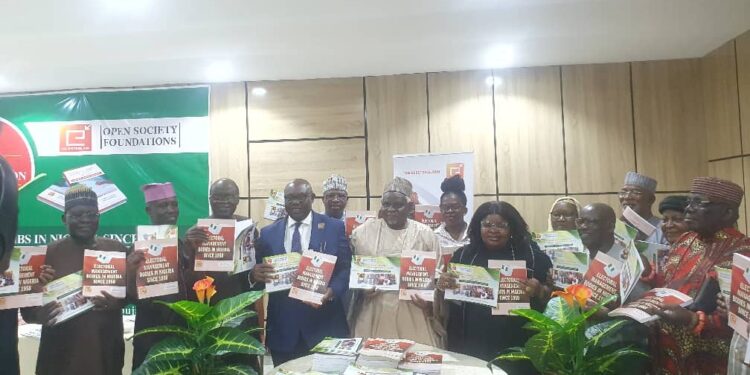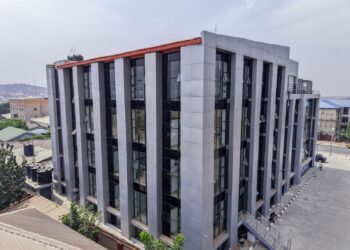The Electoral Hub, a multidisciplinary strategic think-tank focusing on promoting credibility and integrity of the electoral process, on Friday unveiled a book on Election Management Bodies in Nigeria since 1985 to serve as guide for credible elections and improved democracy.
The book by the Electoral Hub, an organ of the Initiative for Research, Innovation and Advocacy in Development (IRIAD),revealed the history of electoral commissions over the years in order to understand the present and forecast the future.
Prof. Adele Jinadu ,the book reviewer,described the book as a fascinating research that provides historical analysis of the evolution of electoral commissions in Nigeria.
“The monograph provides a bird’s eye overview of the evolution of electoral commissions in Nigeria since 1958, divided into the following historical sequences: (a)1958-1960; (b) 1960-1963; (c) 1961-1966; .(d)1976-1983; (1987-1983; (f) 1995-1988; and (g)1998 to date.
“The analysis is, however, set against the constitutional and wider political history of Nigeria, in relating the origins of elections in Nigeria to the introduction of a rudimentary albeit miniscule and flawed system of elective principle in the country in 1923.”
Jinadu said in the earliest period, the system was small and flawed primarily because it was hugely unrepresentative providing for only three unofficial members from Lagos and one from Calabar until 1959 that universal adult suffrage and male adult suffrage were adopted.
According to him , the monograph is a significant piece that sheds light on the challenges of the electoral governance since the introduction of the system of responsible and semi-cabinet government and the establishment of the Independent National Electoral Commission (INEC).
He said such research studies were rare to find and therefore, recommended an urgent need to develop a strong think tank or research unit within INEC and INEC’s Electoral Institute should be strengthened to play that role.
Also speaking, the INEC Chairman, Prof. Mahmood Yakubu, represented by Prof. Abdullahi Zuru ,said that the sovereignty in any democracy lies with the people electing their owneaders.
“In other words, they confer legitimacy on those they wish to govern them by giving them their votes voluntarily.
“Simply put, the legitimacy of any government lies in the credibility of the electoral process that brought it to power. Herein lies the significance of credible Election Management Bodies (EMBs).
“It is in recognition of this fact, that INEC, as the Election Management Body , places high premium on ensuring that the electoral process in Nigeria is free, fair, credible, inclusive, transparent and most importantly verifiable.”
Yakubu said that the book therefore,provided the opportunity for readers to assess Nigeria’s democratic leadership recruitment processes and possibly their impact on the governance processes.
The Director General of the National Institute for Legislative and Democractic Studies (NILDS), Prof. Abubakar Suleiman, commended the initiative adding that the book offered an opportunity to take stock of the country’s electoral management governance system.
He added that the book came at a very important time in Nigeria’s democratic journey offering an opportunity to take stock of the electoral management governance system to reflect and learn lessons from.
“The electoral process has evolved and today the pre-election, election, and post-election phases of the electoral cycle have become more inclusive than was the case many years ago. This would not have been possible without the commitment of stakeholders across board.”
Also speaking Festus Okoye, bared his mind on some of the challenges being encountered during election periods, noting that the book may serve as a guide to mitigate numerous challenges.
The Director, IRIAD – The Electoral Hub, Princess Hamman-Obels ,said the book was unveiled as part of efforts towards achieving credible elections and quality democracy in Nigeria.
Hamman-Obels added that the book aimed to stimulate interest and collective action towards improved electoral governance for credible elections in Nigeria.
“The study we are presenting today, “Election Management Bodies (EMBs) in Nigeria since 1958,” was conducted with the support of the Open Society Foundations.
“This public presentation has three interrelated objectives, to share insights from the research with a broader audience, garner perspectives of experts and stakeholders on the experiences within EMBs in Nigeria.
“It is to also stimulate interest and collective action towards improved electoral governance for credible elections in Nigeria.”
Hamman-Obels said the research examined the actions of successive election management bodies and their contributions to the evolution of the electoral process, including aspects such as gender, age, and regional inclusiveness within EMBs.
She said the research explored the legal frameworks, landmark judicial decisions, and other influences that have shaped the functionality of EMBs.











